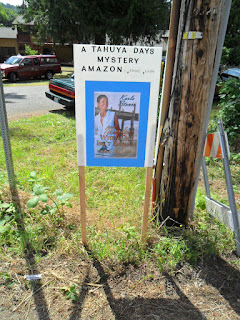Hellllooooo (sing-song, soprano voice). How are you enjoying
the summer so far? Hot enough? I live in the country north of Toronto and it is
hot. 48 Celsius with the humidity. It feels like the Sahara desert and a
Florida mangrove swamp all rolled into one. Thank God for air conditioning!
How do you politely tell them not to be a cheap tard? That’s
my polite version: tard without the bas in front of it. I mean, for under four
bucks, you can enjoy the results of one year’s work. That’s a bargain, isn’t
it? Please - if you have any suggestions about how to politely sway these tards,
I’d love to hear from you. Your comments and thoughts are appreciated and
welcomed!
Before I change the subject, I have to say something about
the cover designer for Books We Love, Michelle Lee. Her work is outstanding. The Twisted Climb (pictured here) is in
the young adult genre and Michelle’s selection for font and character
representation is absolutely spot-on. The book contains drama, suspense,
fantasy and paranormal events and the cover is a perfect reflection of that. Michelle
Lee, you rock!
Unfortunately, the pangolin is on the endangered species
list because they are being eaten to extinction through illegal trading/selling
in underground black markets. Sad but true. In many third world countries, and
under the guise of medicinal/quackery black magic, pangolins are slaughtered by
the thousands. Some say that eating baby pangolins will enhance virility,
prevent hair loss and eliminate migraines. Others say that grinding pangolin
scales will enhance virility, prevent hair loss, cure dandruff and a multitude
of other nonsensical conditions. In reality, pangolin meat and scales do
nothing to enhance the human body. The truth is that continuous slaughtering of
the pangolin will only augment the ignorant traditions and will ultimately result
in the extinction of the species. Personally, I say no to that.
I’ve written a series of five children’s pictures books
about these gentle creatures (still on the hunt for a publisher). It is my
great hope that these books will place the pangolin in a new light, one where
they are appreciated and not viewed as a black market quackery by-product.
J.C. Kavanagh
The Twisted Climb





















